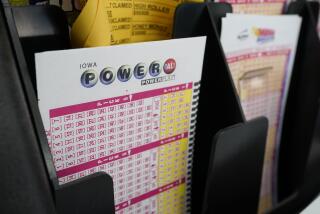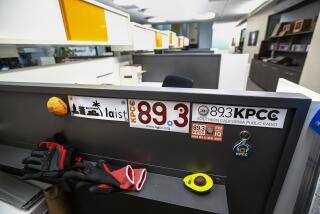The Odd One Out in Office Lotto Pool
While a number of Times employees are contemplating buyouts offering two weeks’ pay for every year of service, they have a much better retirement plan over at Kaiser Permanente in Garden Grove.
They hit the lottery last week.
Six lab techs and a receptionist each pitched in $3 to buy 21 tickets. Actually, one of them had only $2 and bummed a buck off one of the others. Had I been one of the other six, I wouldn’t have let her in on the pot after we won.
They called themselves the Lucky 7 after winning $315 million.
If I know anything about human nature, that’s not what their co-workers are calling them.
The guess here is that the seven won’t be long for the office. They may love their work and find incredible fulfillment each and every day at their desks, but they’ll have little choice. No matter how harmonious an office may be, knowing the person in the desk next to you is $25 million richer is enough to breed some jealousy. That’s the figure lottery officials say each one will get by taking the money in a lump sum.
As an example, I’m thinking of the guy who sits closest to me in the office. Fine young man, beautiful wife, delightful 2 1/2 -
year-old daughter. Couldn’t be more pleasant.
If he hit the lottery for
$25 million, I’d never forgive him.
The Kaiser Permanente group has another issue. As you may have deduced, the seven employees don’t constitute the entire workforce. But they were the only seven who banded together to buy tickets.
I don’t even want to know whether other officemates were asked to join in. Imagine you’re the person who sits within earshot of the group as lottery money is being collected, but you aren’t asked.
Then think of $315 million divided by eight instead of seven. With you being No. 8.
Ouch.
Or, even worse, and this apparently happened: The group offered another woman a chance to chip in, but she declined. She reportedly had been gracious in congratulating her co-workers, which tells me it hadn’t quite sunk in on her yet.
I’m imagining her prayer the night she found out: “Dear God. One question: Why?”
I go through this nonsense every time someone hits the Big One. It’s not the fear that I won’t win; it’s that someone I know will.
In 2002, a number of my colleagues solicited contributions in the office. They wanted $5 each, a price I considered much too steep. I think they did some chanting before they bought their tickets, enough so that I thought they might win.
Then I spent an unpleasant few days, growing increasingly certain that they would win. Luckily, they didn’t, and three strangers split $193 million.
In August 1994, four employees at an Irvine insurance company cashed the winning ticket and split $6.8 million. No doubt knowing what awaited them from co-workers after hitting the lottery on Wednesday, they quit on Thursday.
In 1999, the proverbial “regular guy” from Anaheim won $40.6 million all for himself. He won on a Wednesday, but didn’t present himself at lottery offices for five days, unsure of how to cope with his new wealth and fame.
Last week’s Kaiser Permanente employees didn’t announce immediately whether they planned to quit. Give them time. Maybe they want to decide if their jobs as lab techs and receptionists are as vital to their lives as they once thought.
If they go back, I suggest Kaiser Permanente’s human resources department immediately call in its employees and give them tips on how to handle the sudden infusion of tremendous personal wealth -- no, not for the lottery winners, but for their co-workers. They’re the ones who are going to need help.
That, however, probably won’t happen.
Which is why I’m guessing this is the last you’ll hear of the Lucky 7.
To be replaced by The Soon-to-Be-Out-the-Door 7.
More to Read
Inside the business of entertainment
The Wide Shot brings you news, analysis and insights on everything from streaming wars to production — and what it all means for the future.
You may occasionally receive promotional content from the Los Angeles Times.










